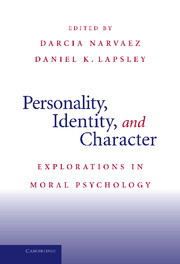Book contents
- Frontmatter
- Contents
- Contributors
- Introduction
- 1 The Moral Personality
- 2 The Moral Functioning of the Person as a Whole: On Moral Psychology and Personality Science
- 3 Moral Science? Still Metaphysical After All These Years
- 4 Cultural Pluralism and Moral Identity
- 5 Neuroscience and Morality: Moral Judgments, Sentiments, and Values
- 6 Triune Ethics Theory and Moral Personality
- 7 Early Foundations: Conscience and the Development of Moral Character
- 8 The Development of the Moral Personality
- 9 Urban Neighborhoods as Contexts for Moral Identity Development
- 10 Moral Personality Exemplified
- 11 Greatest of the Virtues? Gratitude and the Grateful Personality
- 12 The Elusive Altruist: The Psychological Study of the Altruistic Personality
- 13 Growing Toward Care: A Narrative Approach to Prosocial Moral Identity and Generativity of Personality in Emerging Adulthood
- 14 Moral Identity, Integrity, and Personal Responsibility
- 15 The Dynamic Moral Self: A Social Psychological Perspective
- 16 The Double-Edged Sword of a Moral State of Mind
- 17 Moral Identity in Business Situations: A Social-Cognitive Framework for Understanding Moral Functioning
- 18 The Moral Functioning of Mature Adults and the Possibility of Fair Moral Reasoning
- 19 Moral Personality: Themes, Questions, Futures
- Author Index
- Subject Index
17 - Moral Identity in Business Situations: A Social-Cognitive Framework for Understanding Moral Functioning
Published online by Cambridge University Press: 05 June 2012
- Frontmatter
- Contents
- Contributors
- Introduction
- 1 The Moral Personality
- 2 The Moral Functioning of the Person as a Whole: On Moral Psychology and Personality Science
- 3 Moral Science? Still Metaphysical After All These Years
- 4 Cultural Pluralism and Moral Identity
- 5 Neuroscience and Morality: Moral Judgments, Sentiments, and Values
- 6 Triune Ethics Theory and Moral Personality
- 7 Early Foundations: Conscience and the Development of Moral Character
- 8 The Development of the Moral Personality
- 9 Urban Neighborhoods as Contexts for Moral Identity Development
- 10 Moral Personality Exemplified
- 11 Greatest of the Virtues? Gratitude and the Grateful Personality
- 12 The Elusive Altruist: The Psychological Study of the Altruistic Personality
- 13 Growing Toward Care: A Narrative Approach to Prosocial Moral Identity and Generativity of Personality in Emerging Adulthood
- 14 Moral Identity, Integrity, and Personal Responsibility
- 15 The Dynamic Moral Self: A Social Psychological Perspective
- 16 The Double-Edged Sword of a Moral State of Mind
- 17 Moral Identity in Business Situations: A Social-Cognitive Framework for Understanding Moral Functioning
- 18 The Moral Functioning of Mature Adults and the Possibility of Fair Moral Reasoning
- 19 Moral Personality: Themes, Questions, Futures
- Author Index
- Subject Index
Summary
The concept of moral identity has gained considerable theoretical and empirical traction since Augusto Blasi (1983) used the term in his Self Model of Moral Functioning over 20 years ago. Since then, a number of scholars (Aquino & Reed, 2002; Colby & Damon, 1992; Hoffman, 2000; Lapsley & Narvaez, 2004) have expanded on Blasi's ideas, and the collected papers in this volume testify to the variety and richness of these perspectives. In this chapter, we contribute to the ongoing conversation about the role of moral identity in guiding moral action by presenting a social-cognitive model that we apply to the domain of business. As researchers whose areas of study are organizational behavior and marketing, we are convinced that the concept of moral identity holds enormous promise for broadening our understanding of how moral constructs and concerns influence business activities, ranging from negotiations, leadership, and teamwork, to strategic decision making, advertising, and consumer behavior. Our aim is to take moral identity from its roots in developmental psychology and apply it to a new arena where moral decisions – questions about right and wrong – are unavoidable, and where people often have to make difficult tradeoffs among competing and equally compelling moral values.
The outline of our chapter is as follows. First, we briefly review the social-cognitive perspective on moral identity, highlighting a conception proposed by Aquino and Reed (2002) that defines moral identity in terms of its self-importance. Second, we present a model that situates moral identity within a network of other constructs that have been shown by prior theory and research to be related to moral behavior.
Information
- Type
- Chapter
- Information
- Personality, Identity, and CharacterExplorations in Moral Psychology, pp. 375 - 395Publisher: Cambridge University PressPrint publication year: 2009
Accessibility standard: Unknown
Why this information is here
This section outlines the accessibility features of this content - including support for screen readers, full keyboard navigation and high-contrast display options. This may not be relevant for you.Accessibility Information
- 45
- Cited by
